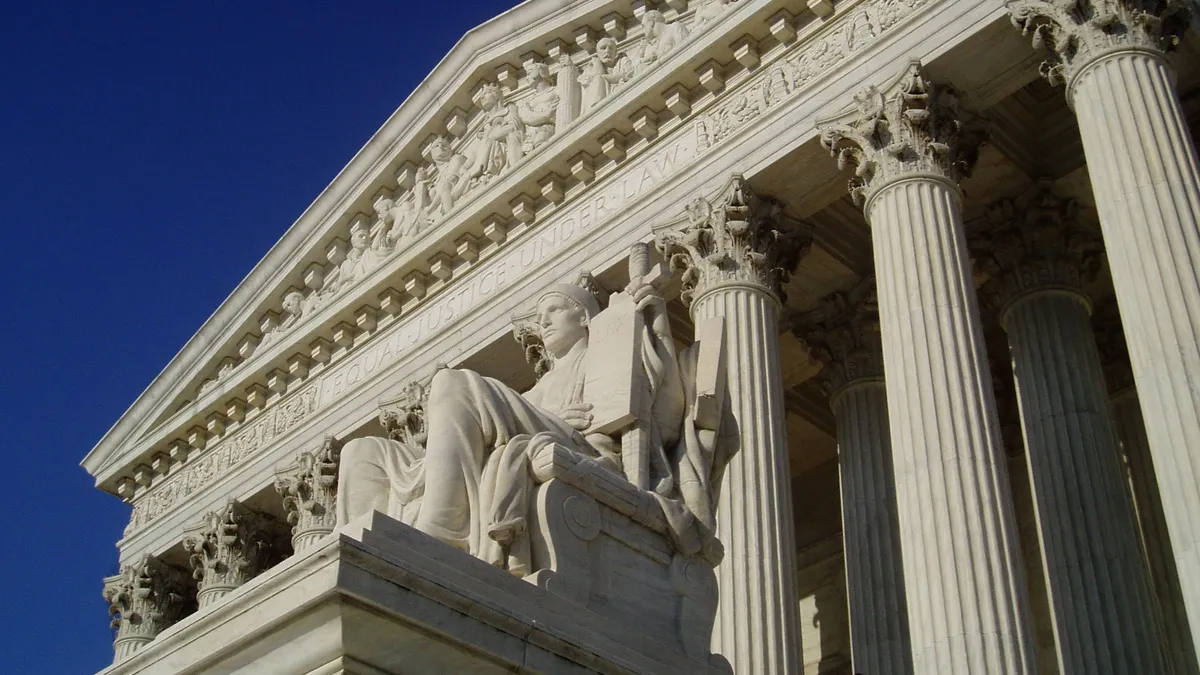UPDATE: June 18, 2020: Despite a 7-2 Supreme Court decision allowing construction of the Atlantic Coast Pipeline to cross under a national park trail, Dominion Energy requested a two-year extension on Tuesday from the Federal Energy Regulatory Commission, "due to unforeseen delays in permitting."
Dive Brief:
- The Supreme Court issued a 7-2 ruling on Monday overturning a lower court decision that halted construction of the 600-mile Atlantic Coast Pipeline (ACP).
- The ruling gives the U.S. Forest Service the authority to grant the pipeline's developers right of way on the $7.5 billion project as the project goes over 600 feet underground across a portion of the Appalachian Trail, which is part of the National Park System.
- The pipeline, owned by Duke Energy and Dominion Energy, faces other permitting hurdles, opponents said before Dominion requested an extension. Dominion and Duke issued statements that the ruling is "an affirmation for the Atlantic Coast Pipeline." ACP "is needed now more than ever for our region’s economy and our path to clean energy," as the utility transitions away from coal, Dominion spokesperson Ann Nallo said in a statement.
Dive Insight:
Although other permits and regulatory hurdles remain, the Supreme Court decision on Atlantic Coast Pipeline LLC v. Cowpasture River Preservation Association is likely to encourage more oil and natural gas companies to construct in areas previously off-limits for development, environmental advocates say.
"We're going to continue to see a bit of a whack-a-mole problem with pipeline construction, both specific to the ACP and other pipelines for a while, because pipeline companies now feel emboldened to try things that would not have been tried before," Gillian Giannetti, a Natural Resources Defense Council (NRDC) attorney, told Utility Dive.
Advocates for oil and natural gas development also see this as an opportunity beyond the development of the Atlantic Coast Pipeline.
"Long term, [the decision] allows pipeline companies to plan pipeline routes with certainty on how to cross the 780-mile long Appalachian Trail and will allow the development of natural gas fields in less-populated areas to the west," Mark Burghardt, partner at Dorsey & Whitney representing oil, gas and other energy clients, said in a statement.
The ruling will also affect the Mountain Valley Pipeline, a 303-mile project slated to run from West Virginia to southern Virginia by crossing a trail in the Jefferson National Forest. Construction on the nearly completed project — a joint venture among NextEra Energy, EQT Corporation and others — halted due to the Atlantic Coast Pipeline case, but the project is also intended to meet Dominion's natural gas supply needs.
"This decision paves the way to supply natural gas to parts of Virginia and eastern North Carolina, allowing access to more affordable energy for those who need it and delivering the economic and environmental gains that natural gas brings to communities," Karen Harbert, president and CEO of the American Gas Association, said in a statement.
Justice Clarence Thomas wrote the majority opinion, which reversed and remanded the Fourth Circuit's decision. Justices Elena Kagan and Sonia Sotomayor dissented.
The majority opinion and the dissent maintained in their conclusions that the matter is "clear and simple and direct; it's self-evident," according to Giannetti.
"This case largely came down to different routes of statutory interpretation... I thought that was interesting that both said this is a really open-and-shut case but, of course, came to different conclusions. I do think there's some idiosyncrasies with this case that lead to that," she said.
The question remains whether or not this decision impacts other park systems that are also parts of national forests, according to a friend-of-the-court filing from NRDC.
"The lower court's ruling would essentially create a barrier along a large portion of the east coast to moving hydrocarbons from where they are produced to where they are used. This consequence could not have been intended by Congress in enacting the Trails Act," Burghardt said.















